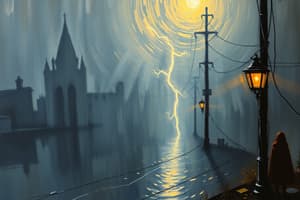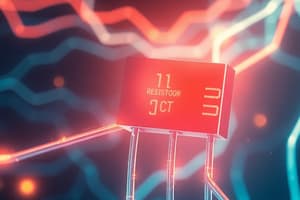Podcast
Questions and Answers
Which component is essential to the formation of an electric circuit?
Which component is essential to the formation of an electric circuit?
- Insulator
- Transformer
- Capacitor
- Conductor (correct)
What does Ohm's Law state about the relationship between current and resistance?
What does Ohm's Law state about the relationship between current and resistance?
- They are inversely proportional (correct)
- They are not related
- They are directly proportional
- Resistance increases current
In an electric circuit, what is the consequence of doubling the voltage according to Ohm's Law?
In an electric circuit, what is the consequence of doubling the voltage according to Ohm's Law?
- Increase resistance
- No change in current
- Double the current (correct)
- Halve the current
How does increasing resistance affect the electric current in a circuit?
How does increasing resistance affect the electric current in a circuit?
What is the heating effect of electric current primarily dependent on in a circuit?
What is the heating effect of electric current primarily dependent on in a circuit?
What is the main reason why heat is generated in a material when high current flows through it?
What is the main reason why heat is generated in a material when high current flows through it?
How does the thickness of a metal wire affect the heating effect when placed in boiling water?
How does the thickness of a metal wire affect the heating effect when placed in boiling water?
Which fundamental concept is crucial to understanding how power sources transmit energy via circuits?
Which fundamental concept is crucial to understanding how power sources transmit energy via circuits?
According to Ohm's Law, what happens to the current flowing through a resistor if the voltage across it is doubled?
According to Ohm's Law, what happens to the current flowing through a resistor if the voltage across it is doubled?
When comparing a thick copper wire with a thin copper wire carrying the same current, which wire generates more heat?
When comparing a thick copper wire with a thin copper wire carrying the same current, which wire generates more heat?
Flashcards are hidden until you start studying
Study Notes
Electricity is a form of energy that results from the flow of electrons through conductive materials due to an electrical potential difference. To understand electricity better, let's explore some key concepts related to it:
Electric Circuits
An electric circuit consists of two main components: a power source and a conductor (usually wires) connected together. In order for there to be a complete electric circuit, the wire must connect the positive terminal of one device to the negative terminal of another. This connection allows electron flow between the devices, making them work properly.
Electric Current
Electric current refers to the movement of charge carriers—in this case, electrons—within the circuit. Electrical current flows in closed loops within a circuit. It can flow in both directions if permitted by the circuit arrangement. The amount of charge passing any point in a circuit per unit time is called the electric current.
Ohm's Law
Named after German physicist Georg Simon Ohm, Ohm's law describes the relationship among voltage, current, and resistance in an electric circuit. According to this law, the current flowing across a resistor is directly proportional to its voltage drop; doubling the voltage will double the current and halving the voltage will halve the current. On the other hand, the current is inversely proportional to the resistance; increasing resistance decreases current while reducing resistance increases current.
Heating Effect of Electric Current
When high current flows through a material with inherent resistance, such as a metal wire, heat is generated because of what's known as Joule heating. This process occurs when electric charges undergo accelerations and decelerations when they move against the force exerted by the material's resistance. Essentially, the more resistance you have, the more heat is produced. For instance, if you were to place two different thicknesses of identical metal wiring into water heated to boiling temperature, the thicker wire would take longer to reach the boiling point because the thin copper wire has less resistance, allowing for easier transfer of the electric charge, and thus generates less heat.
In summary, understanding electricity involves comprehending how power sources transmit their energy via circuits, recognizing the fundamental concept of current flow, applying Ohm's Law to calculate relationships among voltages, currents, and resistant elements, and acknowledging the physics behind heating effects caused by currents in various situations.
Studying That Suits You
Use AI to generate personalized quizzes and flashcards to suit your learning preferences.




